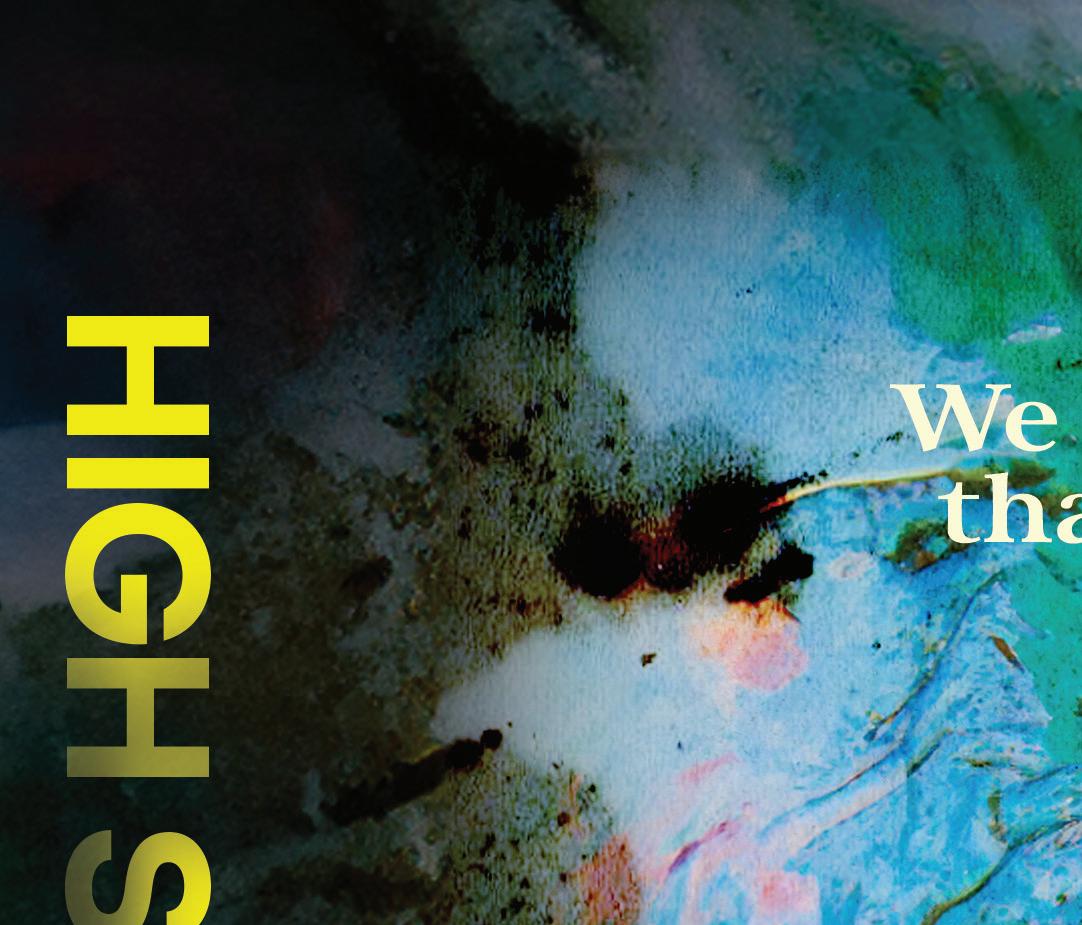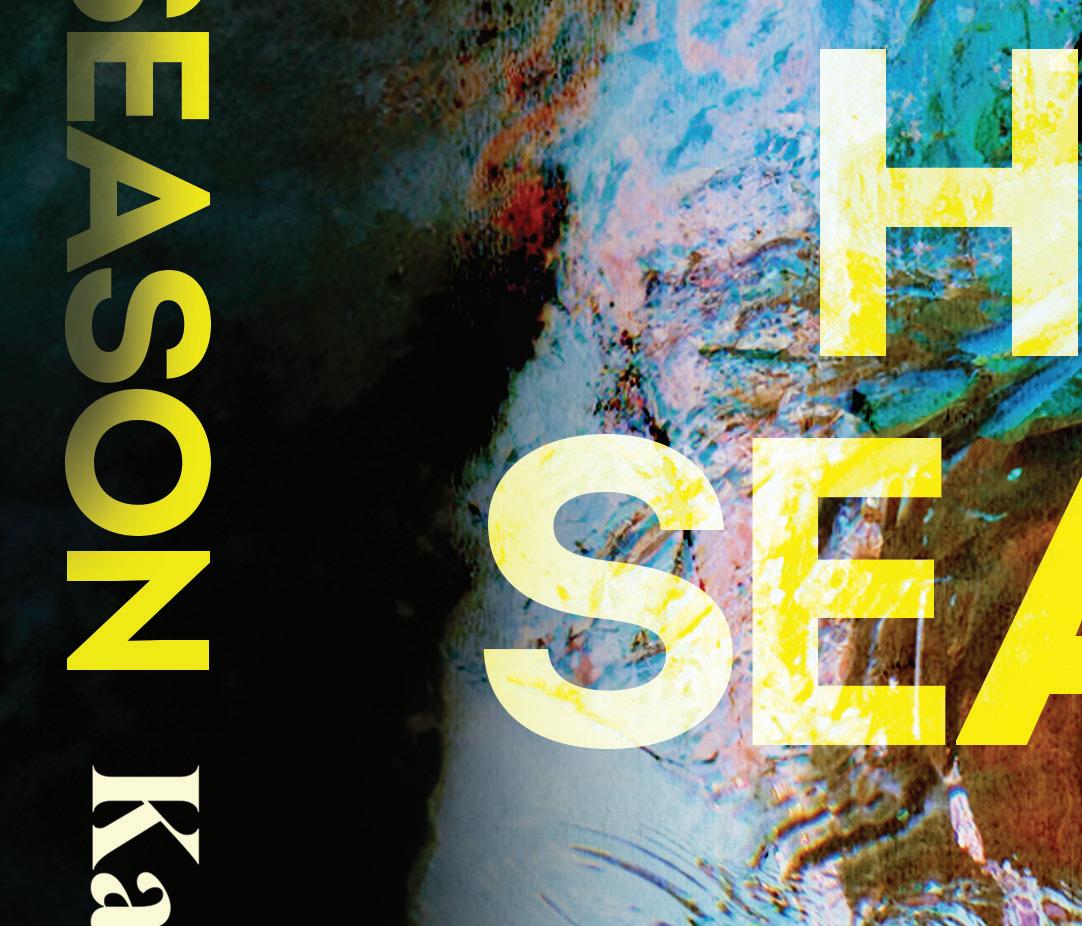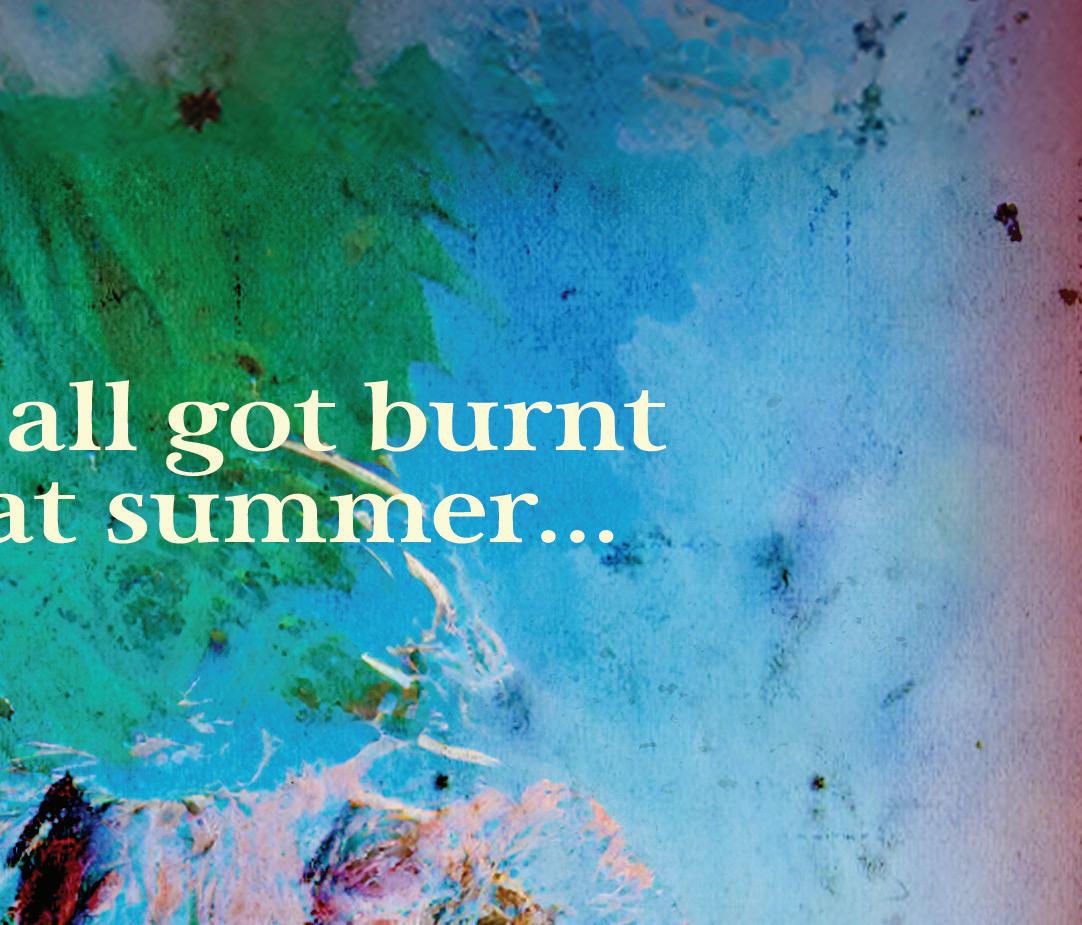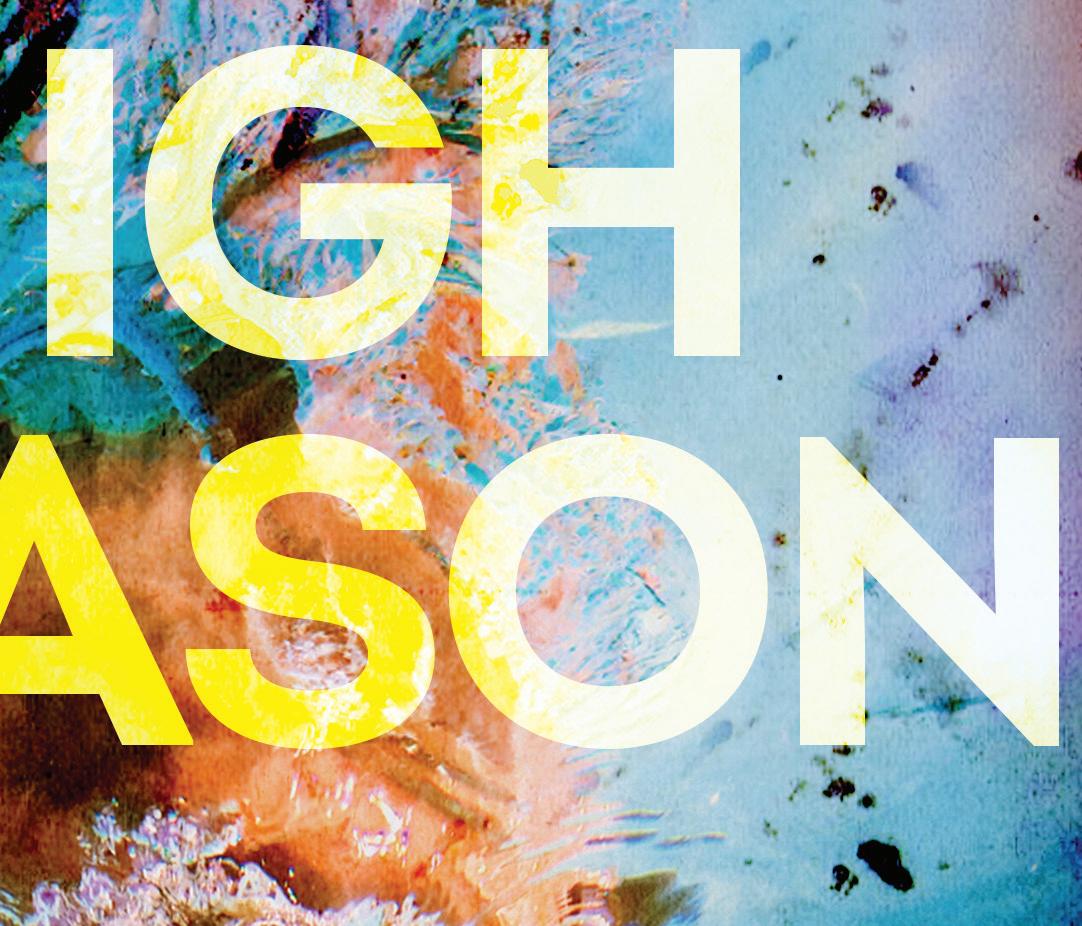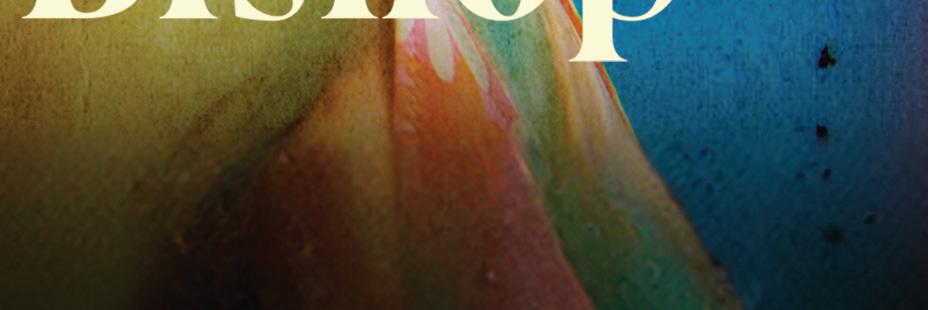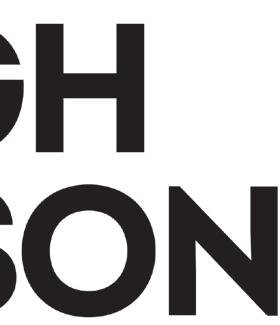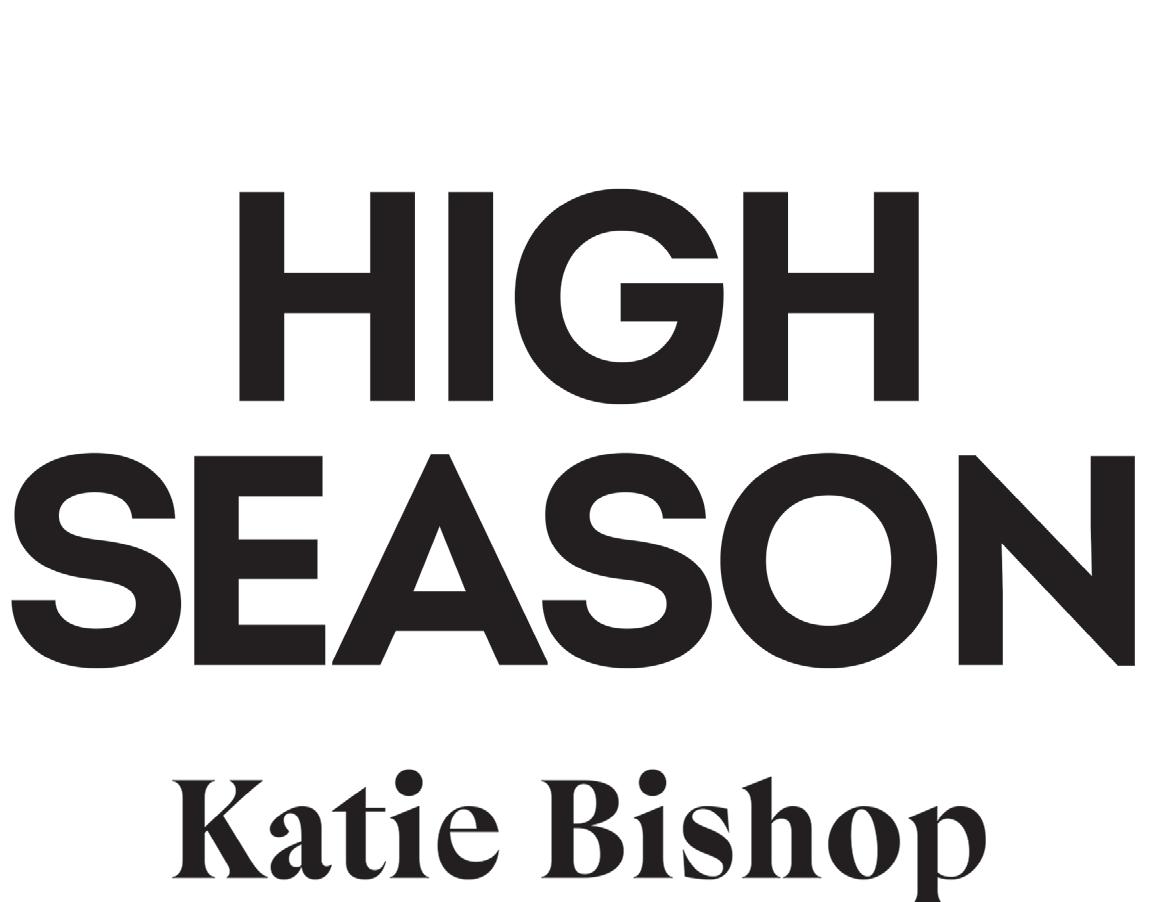One TwenTy yeArs laTer
2024
The dinner party had been Ryan’s idea.
He had suggested it a week ago, when he and Nina were having drinks at his members’ club in Soho— an anniversary date that had morphed into an impromptu celebration of the job offer that had landed in her inbox that morning.
“Your first proper, grown-up job,” he had said. “That’s worth cracking a bottle of good wine for, surely.”
Nina had tried to rebuff the idea at first. She was twenty-five, after all, and it had taken her much longer than most to arrive at the promised land of full-time employment. The fact that she had only just secured her first salaried wage— something that almost all her friends had enjoyed for years—felt like an embarrassing admission rather than something to celebrate. But Ryan was adamant. He would plan it all. Nina wouldn’t have to worry about a thing.
Now they’ve had several bottles of good wine, more than Nina has kept count of. She’s tipsy; a starry haze has settled over the evening, the sun melting just below the rooftop beyond their flat. The table is strewn with empty plates, still slicked with salad dressing and seafood shells, everyone too drunk to suggest clearing up. Nina sits on the windowsill, her glass half- empty, her white wine warmed through with the early summer heat, as Ryan tops up everyone’s drinks.
“Cheers.” Her brother Blake leans over from his seat on the sofa to clink his glass against hers. “You worked hard for this, you know. You deserve it.”
Nina can tell that he’s drunk by the way the rims of their glasses tap together slightly too hard, a tiny tsunami of wine sloshing over the edge. She has worked hard for this. A postgraduate degree and years of clinical training, not to mention the endless job applications, the slog of rejections before, finally the offer that came through last week. An assistant clinical psychologist role at a small London clinic.
“Child psychology, though,” Blake says now, shaking his head. “Bit close to the bone, don’t you think?”
“So you’ve said,” says Nina. “About twenty times, actually.”
She gives him a gentle nudge.
“Come on, Blake,” she says, smiling. “You understand why.”
He sits back heavily in the chair. “I just think it’s a bit morbid, isn’t it? You know that Mum’s still hoping you’ll change your mind.”
Nina takes another sip of her wine. Châteauneuf- du-Pape Blanc. Their mother’s favorite.
“That’s not all she’s hoping you’ll change your mind about,” Blake says.
He reaches out for Nina’s hand.
“Come back this summer,” he says, his voice wheedling. “Please. It would mean a lot to Mum. It would mean a lot to me.”
“You know I can’t,” Nina says.
She starts to stand. Extracts her hand from Blake’s.
“I’ll go and sort pudding.”
“Nina, don’t be like that. I didn’t mean to—”
“It’s fine, Blake. Just not tonight, OK? Not when Ryan’s put so much effort in. We’ll talk about it another time.” 7
later, Nina fills the sink full of scalding hot water. The flat has two dishwashers, but she likes to wash up by hand. She likes to look out over the city through the kitchen window as she scrubs, a small, mindless task as voices drift from the living room. Blake and Ryan are discussing her brother’s flight to the South of France tomor-
row, his plans to spend summer with their mother at the family home on the Côte d’Azur. Her best friend Claire is fussing with the antique record player that once belonged to Nina’s grandfather.
Nina piles pans into the sink to soak. Outside the enormous sash window, the sky has that strange cerebral quality that only comes at the cusp of summer. Pink clouds blossoming against a purple twilight. Heat crawling upward as if trying to escape the city.
Nina always forgets how suffocating London gets at this time of year. How the air tastes of car fumes, the roads tangled up with people escaping for cooler patches of the country. Smoke from balcony barbecues. Sweat rising from bodies packed into tube carriages. The warm tarmac, the rubbish starting to stew and bake in unemptied bins. Not for the first time, she has the overwhelming urge to take Blake up on his offer. To go back to the place that somehow, in spite of everything, still feels like home.
“God, I would kill for this kitchen.”
Claire marches through the industrial glass doors that lead from the lounge, a pile of plates stacked up in her hands—three scraped, only Nina’s almost untouched. She deposits them on the countertop and runs her fingers down her linen skirt as if checking that she hasn’t dropped the dregs of four sticky toffee puddings down herself. She hasn’t, of course. Nina’s best friend always looks astonishingly put together, with her rotating selection of pastel- colored headbands and the same signature lipstick that she’s worn every day since Nina met her when they were both eighteen, on their first day of university. Nina had stayed close to home, in London, her mother insisting that she wouldn’t be able to cope with a big move. Still, she had been terrified on her first day, embarrassed that her mum had insisted on their private driver dropping her off at her halls of residence. She had clutched a bottle of gin that she had planned on using as a peace offering for her new flatmates as the porter informed her, one eyebrow raised, that John Lewis furniture deliveries had been arriving for her small single room all week (Well, you can’t sleep in a bed that someone else has already slept in, her mother announced when Nina had called her, mortified, as the porter looked on).
Claire had bowled into the shared kitchen just as Nina, red-faced,
oversaw a Fortnum & Mason order that the delivery driver had insisted on transporting straight to her refrigerator.
“Gin!” she had announced, spotting the forgotten bottle abandoned on the countertop. “It always makes me a bit loopy, but I never learn. I’ve got tonic in my groceries somewhere, if you want to do a trade?”
It was one of the things that had drawn Nina to her. Claire seemed like someone who was completely unfazeable.
“Ryan’s flat is incredible,” Claire continues. “How much did he pay for this place again?”
Nina doesn’t remind her that it isn’t Ryan’s flat. Not anymore. It’s their flat now. Has been since Nina moved in eight months ago. But Claire’s mistake is understandable. There’s so little of Nina in the swathes of marble, the engineered-wood floors, the way the entire flat is rigged up with gadgets—speakers and smart systems running through the walls like veins. Nina makes a mental note to put up some pictures before Claire comes round again. She should ask Blake what happened to all of the art that their mother had in storage. Perhaps she could find something a little more like Nina.
“It needed work. He got a good deal,” Nina says, even though it’s not exactly true. She hates talking money. Wants to avoid getting into a discussion about how Ryan is technically letting her live here for free, an agreement that started when Nina was job hunting and which has yet to lapse. She’s offered to pay rent, of course, but Ryan said that it wouldn’t be fair when only his name was on the mortgage.
“Hey, your brother is looking good tonight,” Claire says, lowering her voice. “Did you say that he broke up with . . . what’s her name?”
“Jazmin?”
“That was it. Jazmin. Because I kind of got a vibe from him over dinner. Did you notice?”
Nina turns away to hide her smile. She’s used to people being this way around her brother. She had barely even got a chance to know Jazmin before Blake mentioned, in passing, that he had a date with a girl he’d met at an art gallery opening.
“What about Jazmin?” she had asked.
“Oh, Jazmin,” Blake had said, as if Nina was bringing up a long-lost
acquaintance rather than the girl they’d all been out to dinner with the week prior. “Well, we wanted different things.”
As usual, Nina had wanted to say. Blake is in his late thirties, but he seems so far from settling down that Nina sometimes feels embarrassed by how early she herself has fallen into long-term coupledom. She has become used to meeting a new girlfriend of Blake’s every few months, some sweet and beautiful woman who seems completely besotted with her brother.
“You know Blake,” Nina says. “He can turn on the charm when he wants to. Don’t read too much into it.”
“Right,” says Claire. “Oh well. My turn eventually.”
She bumps her hip against Nina’s to show that she’s joking.
“Hey, your phone was going off, by the way. Want me to grab it for you?”
“It can wait,” says Nina. She pulls the plug from the sink so the water can drain, disappearing in a swirl. She is here. She is with all of the people that she cares about the most. “Whoever it is, I’m sure they can wait.”
Claire sways slightly on her feet, wraps her arm around Nina and pulls her close.
“I’m so proud of you, babe,” she says. “You’re killing it.”
And somehow, Nina can’t quite bring herself to point out Claire’s poor choice of words.
Nina had told Ryan what happened to her sister on their second date. He had been sitting across from her, pouring her a glass of red wine.
“So,” he had said. “Do you have any siblings?”
The restaurant hummed around them, as if Ryan hadn’t asked Nina the question that she had spent most of her life dreading.
“It’s a bit complicated,” she had said. And it had all begun there.
Nina had met Ryan two weeks earlier at a recruitment fair in a drafty university hall. Ryan ran a technology start-up that had a stand, and even though Nina didn’t have the slightest interest in data programming she lingered, picking up a leaflet and pretending to read. He had asked her if she was considering a career in the tech sector, and when she admitted that she was already signed up to do a psychology master’s next year and had only come along to keep her best friend Claire company, he had grinned.
“A master’s in psychology?” he said. “Well, clearly you’re too smart to work for us.”
She had liked him immediately.
“Why psychology?” he had asked her on their first date, at a cocktail bar with views over the Thames.
Nina had taken a sip of the too-sweet mojito she already regretted ordering and considered her answer.
“I want to be able to understand people,” she had said.
“Do you think that you need psychology to understand people?”
“I think that you need psychology to understand yourself, never mind other people,” she had said, and then been faintly embarrassed by how easily the answer came. What it might say about her. She did not want this smart, older guy who seemed so self-assured to think she was the sort of person who didn’t really know or understand herself, in spite of her psychology degree.
But he had just nodded, and pushed his square-framed glasses up the bridge of his nose in a way that Nina found sweet, and slightly nerdy. Attractive in a way she couldn’t quite quantify.
“Good answer,” he had said, as if it were a test and Nina had passed. It was Ryan who had suggested dinner for their second date. The idea had felt strangely adult, a performance of romance that Nina wasn’t used to. Dinner dates were the things that her mother used to go on, and the words evoked memories of perfume and silken dresses, her mother patting her hair in front of a long mirror and telling Nina and Blake that there was food on a plate in the refrigerator if they got hungry. Nina was more accustomed to university romances. Sleeping with a guy long enough during her first year to eventually be called his girlfriend. A friend with benefits she had fallen for two terms before who got a place on a graduate scheme in America, and had looked at Nina with genuine disbelief when she suggested there might be something more between them.
But she liked how confident Ryan was. How intelligent, and interesting. She liked that he seemed completely oblivious to celebrity gossip, furrowing his brows and saying Who? when Nina referenced Kris Jenner.
She liked the way he looked at her with approval in his eyes. The way it made her feel.
And now, she was sitting across the table from him, knowing that what she was about to say could change everything.
“I’ve got a brother,” she said. “Blake. He’s twelve years older than me.”
From the table next to them came the rise and fall of laughter. A murmur of conversation.
Nina took a deep breath.
“And I had a sister,” she said. “She and Blake were twins. But she died when she was seventeen.”
She had Ryan’s full attention now.
“Oh my god,” he said. “I’m so sorry.”
“It was a long time ago.”
“But still. That must have been terrible.”
“I don’t really remember much about it,” said Nina. “I was only five.”
She lifted her drink and took a long, slow sip. The heat of the alcohol slid straight through her. She set down her glass harder than she had intended.
“It was actually a pretty big thing, at the time,” Nina allowed. “She was killed by somebody.”
Ryan didn’t speak. Didn’t move.
“There was a trial,” Nina said. “A girl whose mother worked for us, the housekeeper’s daughter. She used to spend all her time around our house. Babysitting me, or helping out with the housework. She was sixteen. I had to give evidence.”
For the first time in Nina’s life, the words came easily. It was something she’d talked about so rarely, even though it was often the first thing that people knew about her. She hadn’t even told Claire until they’d been friends for over a year, one night after drinking cheap merlot out of coffee mugs, sprawled on Nina’s bed.
“I already knew,” Claire had confessed, her mouth stained red. For the first time in all the months Nina had known her, she was bashful rather than brash. Embarrassed for Nina, for thinking that she had a secret, when all the world knew.
Ryan’s eyes widened.
“You gave evidence when you were five?”
“I had to,” Nina said. “I was the only one who saw.”
“You saw?”
His voice was quiet now.
“Yes,” said Nina. “I saw.”
“God,” he said. “That’s . . . well. It must be awful. To have seen that. How could you . . .”
He shook his head, the words seeming to fail him.
“It must be terrible for you. To be able to remember seeing that.”
Nina swallowed.
“Memory’s strange,” she said. “It’s hard for me to the details. You know?”
Ryan didn’t say anything, and Nina staggered to fill the space.
“I mostly remember the trial,” she said. “And the aftermath—being taken into a room and asked to draw what happened. I remember exactly what I drew. The pool. My sister—Tamara. Her name was Tamara. And her. Bending down. Pushing her under the water. Josie Jackson. She denied everything, of course. Said that I must have made the whole thing up.”
She paused to take a sip of water, her mouth suddenly too dry after too much wine. How could she explain it? The gray rooms and long corridors. The year of Nina’s life that seemed lost to that drawing, entire days and weeks stretching out between the felt-tip lines. The blue of the pool. The black squiggle of Tamara’s hair. The fluorescent pink of Josie Jackson’s arms.
And all the years since. How she had had to move schools because the other girls seemed afraid of her, as if death was catching. How, even though the police and the social workers spoke gently to her— telling her she’d done the right thing, that Josie Jackson was a bad person and needed to be punished—Nina had felt a bolt of guilt so intense that she had become obsessive about strange things. Handwashing. Counting. Flicking light switches on and off. Believing that if she didn’t track her steps in units of one hundred then some omnipotent force would take another member of her family away. Chewing each mouthful exactly twenty times until her jaw ached and she had no appetite left. Developing an intense anxiety around food, hiding it in napkins and flushing it down the toilet.
Of course, she had had years of therapy. Stuffed animals, and concerned-looking doctors. The nerve- ending fizzle of pain if anyone
ever asked Nina if she had a sister. The way Nina still had to change the channel or leave the room if a courtroom drama ever came up on the television in her university common room.
Nina couldn’t explain these things, and so she didn’t. Instead, she looked Ryan straight in the eye.
“The funny thing is that when I think of it now, that’s what I see. That picture. It’s a trauma response, I suppose. It’s easier to remember the picture than the real thing.”
She was speaking too quickly, running out of air. She took a deep breath.
“That’s why I want to be a psychologist, really,” she said. “I want to help other people— children especially—who’ve experienced trauma at a very young age. I want to be able to show people that you can survive it.”
Ryan’s brow furrowed. He was looking just beyond her. As if he hadn’t heard what she’d said.
“But if you don’t remember it,” he said, “how do you know you weren’t making it up? Kids make things up all the time, right? They make believe. How do you know that you were telling the truth?”
Just then, the waiter turned up with their mains. He topped up their waters, asked if they’d like any sauces, delivered a steak knife to the side of Ryan’s plate with an aplomb that suggested he was delivering a ceremonial sword rather than a simple item of cutlery. By the time he left, the question seemed forgotten. Ryan had moved on. He was already asking about the verdict. How high the cost of a life really was for the woman who killed Tamara, his curiosity shifting into sympathy.
Later, Nina would learn that Ryan was the kind of person who threw out big questions without thinking about the consequences. That his mind was always whirring, searching. It was the kind of bluesky thinking that his investors were always saying he had, the looking outside the box that had made him a start-up CEO at twenty-two. Always inquisitive, always moving quickly on to the next curiosity.
So Ryan had forgotten the question.
Ryan had forgotten the question, but Nina had not. She could not.
Nina would never forget Ryan asking her that question, because it was the first time that anyone had ever said the thing she had always wondered. The hum of fear and guilt that had lodged itself in the back of her brain and refused to budge. The thing that she had always ignored, pushed down, starved out.
And now Ryan, with his straightforwardness, his lack of complication, had simply said it out loud. And now, Nina could only think about that question.
She thought about it all through dinner. When they agreed to order a second bottle of wine, instead of pudding. When Ryan insisted on paying the whole bill, and Nina was briefly struck with the surprise of how differently people could treat her when they didn’t know who her family were.
She thought about it in the taxi on the way back to her flat. When she unlocked the door, and Ryan whistled and said that he’d expected student digs, not a mansion flat in Chelsea with paneled walls and a four-poster bed so large that Nina’s mother often joked it would never fit through the doorway when she moved out.
She thought about it as she explained that the flat had belonged to her grandfather. That she had been living here since their second year of university, after her mother made a fuss about the small, damp student house that Nina had planned to move into with Claire and some of her coursemates, asking, Why on earth would you live there when there’s a perfectly nice flat you could live in for free? That, like everything in Nina’s life, the flat was inherited, another thing passed down through the family that Nina felt she had no right to, but somehow ended up accepting anyway. That she hated the stiff-backed midcentury furnishings, the paintings that were worth more than most people earned in a year, the bar cart heaving with sticky bottles of Cointreau and Pernod that Nina always cringed at when she brought back her beer-drinking friends from the student union.
She thought about it when Ryan kissed her as she was midway through explaining all of this, his hands cupping her face beneath the chin, his mouth hot and firm against hers. As he led her to the bedroom. When he had taken off her dress, his mouth moving all
the way down her body, her neck, the soft outward rise of her hip bones.
Even as he entered her, all Nina could think about was what he had said back in the restaurant.
How do you know that you were telling the truth?
T7he morning after the dinner party, Nina wakes to a pulse in the back of her head, an ache behind her eyes, the sour-mouthed dryness that accompanies a hangover. The room is dark, a benefit of the hideously expensive blackout blinds that Ryan had imported from Germany, but Nina can tell from the panicked feeling in her chest and the fact that Ryan’s side of the bed is empty that she has overslept.
She rolls over and fumbles on the bedside table for her phone. Instead, her hand knocks against a wineglass. Her memories from the night are blurred. Ryan getting annoyed when she failed to put a coaster down on the bedside table. Claire insisting that they do their go-to karaoke routine from their university days—“Don’t Go Breaking My Heart” by Elton John and Kiki Dee, with Claire usually ending up taking over both parts. Blake asking Nina again if she’d fly out with him tomorrow, One last chance, sis. And did Blake and Claire leave together? Nina manages to drag herself up to sit, wincing as she does.
Ryan is already in the kitchen dressed in a shirt and chinos, standing, even though there’s a barstool beside him. He’s religious with tracking everything from his screentime to his steps, and his latest endeavor is to spend at least eight hours per day on his feet. He doesn’t look up from his screen as Nina enters, his fingers tapping against the keypad.
“Morning, sleeping beauty,” he says cheerfully. “Or should I say afternoon?”
“What time is it?”
“Quarter past nine. There’s coffee in the pot if you want it.”
“Let me just brush my teeth first. I’m disgusting.”
“You left your phone out here, by the way,” he calls after her as she crosses into the hallway. “I put it on charge in the living room for you.”
“Thanks.”
Nina swipes her phone off the coffee table as she passes and locks the bathroom door behind her. She sits on the lowered toilet lid as she ignores the pile of notifications at the bottom of her screen to tap into her conversation with Claire.
I feel like shit this morning. Make me feel better and tell me you didn’t go home with my brother last night?
She stands to switch the shower on and leans against the sink, thumbing through messages that she missed last night while the water heats. A notification from Instagram; a newsletter from a psychology magazine she’s long subscribed to but almost never reads; an email sent at half eight this morning from her soon-to-be employer reminding her to read through her contract and let them know if she has any questions. Then, farther down, a subject line that makes her breath catch in her chest.
Tamara Drayton case: twentieth-anniversary documentary (interview request)
The room is hot, filling with steam. Nina has to wipe a film of moisture from her phone screen to make out the text. She has a sick, heavy feeling in her stomach as she scans the message, her eyes skimming too quickly to take much in.
Notorious murder case. Youngest- ever witness. Access to case files. Before she knows what she’s doing, Nina is crouching on the bathroom floor, the tiles damp beneath her skin.
Renewed attention on case. Unreliable witness. Tragic death. Josie Jackson.
She’s lightheaded, her heart falling into beat with the hard drum of water against the ceramic shower stall. She has to close her eyes for a moment. Slow her breath. She tries to remember her exercises from therapy. A long, deep inhale through her nose. A slow exhale through her mouth. When she opens her eyes, the screen seems too bright. The words of the message stark. She scrolls back to the top of the email and reads the whole thing from start to finish, lingering over each word. She reads the email through twice. Turns off the shower, and then reads it a third time. She only realizes that she’s clenching her jaw
when it begins to throb, a sharp pain that cuts through the dull ache of her hangover.
Give me some credit, Claire has responded. Solo taxi home for me. I actually feel OK. Maybe I’m still drunk?
Nina ignores the message. Finds her brother’s number.
What time’s your flight? she types. And is it too late for me to get a seat?
She presses send and then waits, her thumbs hovering above the keypad. Then, before her brother has a chance to open the message, she types out a second text.
We need to talk about Josie Jackson.
2004
six weeks before The birthday party
On the day before high season began, Josie Jackson and Hannah Bailey broke into the Draytons’ swimming pool.
They slipped down the steps, away from the house and onto the broad, flat terrace that stretched out toward the sea. They peeled back the cover to reveal the water, newly cleaned and chemical. They snorted with laughter and hushed each other, even as they both squealed, dive-bombing into the deep end, scattering the quiet of the late-spring air.
They swam lengths as the sun set over the endless flat of the sea. They splashed each other, and saw who could hold their breath the longest. They did handstands, their feet sticking out of the water like flowers breaking through earth. Like they used to when they were children.
Afterward, they stretched out on the ground, their skin wet and stinking of chlorine. The early evening sky was golden, and the water on their bare legs and stomachs glittered.
“Maybe their flight will get delayed,” said Josie.
“Maybe they’ll decide to stay in London this summer.”
“Maybe they’ll decide they’re sick of this house and give it to us.”
Josie nudged Hannah, her elbow sharp in her best friend’s ribs.
“You would hate if they didn’t come,” she said. “You’d be heartbroken. You’ve been counting down the days ’til Blake turns up.”
Hannah wriggled away from her.
“He might not even be coming this year,” she said.
Josie stretched her hands above her head, as if reaching for the last gasps of the day’s heat.
“He’ll be here,” she said. “He will.”
Just then came the distinctive sound of Josie’s mother’s voice, its wiry, perpetually anxious edge drifting down the hill.
“Josie May Jackson, what are you doing with that pool cover?”
They scrambled to their feet before Patricia Jackson could make it down the steps, pulling clothes over their damp bodies, laughing, scurrying to haul the pool cover back on, dashing out the side gate. Leaving only wet footprints behind.
7
Josie and Hannah first met when Josie was ten, Hannah eleven. Josie was new to the town, her family having moved to the Côte d’Azur two weeks earlier. The total upending of Josie’s life back in the UK had come out of the blue. Her taxi-driver dad had met a bloke at the pub who told him that he could make good money working as a private driver for rich expats in the South of France, and within a month they were packing their bags.
Like many of the transitions in Josie’s life (their relocation from London to Kent after her dad remortgaged their house to invest in a timeshare company that never got off the ground; the time she and her brother had to leave the school her mum said she’d moved heaven and earth to get them into when her dad got into a physical fight with the head teacher at parents’ evening; the summer he’d taken them all to Disneyland and then they’d had to do a midnight flit because he’d borrowed the money from a dodgy moneylender to pay for it), the move was characterized by a flurry of hope and optimism followed by a shift to quiet fury and disappointment. They arrived in autumn to find the beaches empty, the village quiet, the flurry of high season
stilled. Most of the people who owned the sprawling holiday homes had already gone home for winter, and the work that Josie’s dad had been promised failed to materialize. Instead, he would spend all day at home, smoking at the kitchen table, cracking open bottles of beer at increasingly early hours of the afternoon. Josie found herself leaving the house more and more often to escape the simmer of tension. She ventured along coastal paths, climbed the trees that lined the winding road to their house. She could stay out for hours, if she had to. Often, she felt like she did.
The first day that Josie met Hannah was a Saturday, the temperature cool, the streets silent. Josie had been able to feel the threat of an argument settling between her parents in the same way that you can feel moisture in the air before a storm. The heaviness had sent her scurrying out of the house and—in an effort to fill time— down toward the beach.
She was remembering how her dad had taken the whole family there on their first morning in France, loud and grinning, buying her and her brother ice cream even though it wasn’t quite warm enough, treating her mum to a brand-new swimming costume from one of the boutiques that lined the seafront still making the most of end-season stragglers. They had been happy. Excited. Her dad had said how great it would be for Josie and her brother, Calvin, to grow up so close to the sea. Josie had dripped ice cream down her T-shirt, and her mum hadn’t even gotten cross about it. In fact, she had been beaming, pinkfaced, looking at Josie’s dad in a way that she rarely did anymore.
Josie wanted the peace and hope of that day to return. She felt, somehow, that if she could make it to the beach, things might feel all right again.
She found her way to the town easily, navigating the rows of shuttered-up restaurants and shops. She located the road that ran parallel to the sea, but somehow couldn’t find the path that led onto the beach. She walked up and down and only found rows of pastel-painted buildings, doors with Fermé pour l’hiver scrawled on hand-painted signs. Her shoes were beginning to rub, and there was a tightness in her chest. She thought again of her parents arguing. The black mood that had descended on their new home. She had to find the beach.
That was when she saw a girl sitting on the front terrace of a shop, her head bent over an exercise book. Long, bare legs and strawberryblond hair. Snorkels and wetsuits strung up above her, swinging in the breeze.
“’Scuse me,” Josie called out. “Do you know the way to the sea?”
The girl’s head jerked up. She frowned. She had light gray eyes, sun-bronzed skin.
“Yeah,” the girl said slowly. “You just need to take the footpath, at the end of the street.”
She lifted her biro to point toward a row of shops.
“It looks like an alley at first. Down the side of that blue house on the left?”
Josie nodded.
“Oh yeah,” she said, trying to sound like she’d simply forgotten. “Thanks.”
She knew that she looked out of place here, with her scruffy ponytail and bitten- down fingernails. Skin that was scorched with freckles, a dead giveaway that she hadn’t spent much time in the sun. Not knowing her way to the sea was surely unforgivable, a sign that she was an outsider.
“Wait.”
Josie turned around. The girl was putting her exercise book down beside her.
“Are you . . .” she said. “Where are your parents?”
Josie shrugged. Scuffed her shoe against the pavement.
“Back at the house,” she says. “We just moved in.”
“Which house?”
“Up over the hill.”
“You walked all the way down here by yourself?” The girl tilted her head to one side. “Do they mind? You must only be—”
“I’m ten.”
Josie couldn’t stop a note of defiance creeping into her voice. She was small for her age, the smallest in her school year back in Kent. People often thought she was younger than she was.
“They don’t mind you coming down here on your own?” the girl repeated.
Josie shrugged again, slowly this time, reluctant.
“They’re fighting,” she said. “Anyway. Thanks very much.”
She stepped back again, toward the footpath.
“Wait.”
The girl was standing now.
“I was actually thinking of going for a swim,” she said. “I’ll come with you.”
She brushed sand from her thighs. Sand seemed to get everywhere, out here.
“I’m Hannah, by the way.”
“Josie.”
Hannah smiled.
“Let’s go,” she said. “The waves are perfect at this time of day.”
N7ow, Josie and Hannah left the Draytons’ pool and walked to the beach, back to the exact place where they swam that first day. They’d been like sisters since then, inseparable for the last six years. Josie, who turned up here without being able to speak a word of French. Hannah, who was bilingual by dint of having a British father but had never quite made friends with the other kids at the international school over the hill, on account of always having to spend her weekends helping out at her parents’ dive shop. Who, Josie now knew, had only gone down to the beach with her that first day because she had seen a small, lost girl and been afraid of what might happen to her. What could come of a child who didn’t yet understand the sea. Its depth and currents. The way a wave could seize hold of you and fill your lungs.
To Josie, they fit together like salt and sand, even though they made a strange pairing: Hannah, who at seventeen was almost six feet tall, with long, thin limbs and a sea of strawberry-blond hair; Josie, who was barely five feet, with a squat, compact frame and short, dark hair that she only ever wore tied up. Hannah, who had developed a way of making herself smaller, hunching her spine and folding her arms across her newly blossomed chest. Josie, who was loud and outspoken. Who had a habit of saying the wrong thing at the wrong time. Who never really cared when she did.
“I’m going in,” said Josie. “Want to come?”
Hannah shook her head.
“It’ll take forever to dry out now the sun’s gone down,” she said. “I’ll wait here.”
Josie stripped off her shorts and T-shirt and waded out until the waves lapped against her waist. Then she held her breath and plunged beneath the surface.
The water was dark, the twilight sky pale and high above her. She closed her eyes. She started to swim. When the beach was a distant sliver, the hill a black shadow against a hollow sky, she flipped onto her back and spread her arms and legs out wide. She floated, starfished, her ears beneath the surface so that she could hear the beat of her own heart.
This was where she felt happiest. Most peaceful. On the edge of something bigger than herself.
When Josie had been submerged for so long that she could feel her skin begin to soften and salinate, she swam back to shore. Short, sharp strokes that made her arms ache. Hannah was waiting exactly where she’d left her, tracing shapes in the sand with a stick. A star. A sun. A spiral. J + H in large, twirling letters. Josie collapsed down next to her, scattering sand across the sun.
“Good swim?”
“Beautiful.”
Josie leaned back, her elbows in the damp sand.
“I hate this bit,” she said. “Waiting for them all. Feeling like we’re on hold until they get here.”
Josie always felt restless as summer approached. To her, the divide between the end of spring and the start of summer was clear and defined. Before summer, this place seemed to belong to her and Hannah. The beach was desolate. The villas that dotted the hill were quiet, dust sheets thrown over furniture, vast bellies of emptiness. They would roam the rooms of the Draytons’ house, where Josie’s mum had gotten a job working as a housekeeper after Josie’s dad walked out just a year after they arrived in France. They would sneak onto the terrace to watch the sunset. They would do their homework at great wooden dining tables made to seat fifteen people.
Then, high season would begin. Cars pulled up in driveways, families filled the grand estates, and beaches heaved with day-trippers. Hannah’s parents would work late. Josie’s mother would be perpetually exhausted and irritable, run ragged by the Draytons. Josie would often have to help out, babysitting the youngest Drayton kid or doing errands down in the town.
At night, there would be bonfires on the sand, the teenage children of their employers carrying down crates of beer, leaving bottles scattered like seashells. The bay that belonged to Hannah and Josie for most of the year would belong to them instead, and the two girls could only slip in through back doors, handing out drinks at parties or accepting twenty-euro notes in exchange for babysitting work, or the occasional tutoring job for parents who wanted to improve their children’s French.
Hannah tossed the stick that she had been drawing with.
“I don’t know,” she said. “I’m kind of looking forward to it this year.”
Josie snorted.
“Looking forward to having to work every weekend and be at some posh person’s beck and call twenty-four hours a day?”
“Oh, come on. You hardly have to work. Looking after a few kids for a couple of hours a week. And we could use the extra money. You could use the extra money. Aren’t you saving?”
Josie had been saving for as long as she could remember. She had showed Hannah her piggy bank the first time her new friend had visited the dilapidated house up on the hill that her dad had insisted was a fixer- upper but then refused to so much as replace a lightbulb.
“I’m going traveling, soon as I turn eighteen,” she said. “I’m going to see the world.”
Now sixteen, she stuck pictures of far-flung places up on her bedroom wall, dreamed about different cities the way that her classmates talked about their dream universities. Hanoi. Buenos Aires. Sydney.
“Don’t you think it can be fun?” persisted Hannah. “Everything comes to life in summer, you know? It’s how this place is supposed to be.”
A quiet fell between them. The soft roar of stones rolling beneath the waves.
“I like it better when it’s just us,” said Josie at last. Hannah stretched out so that her face was turned toward the sky.
“I have a good feeling about this year,” she said. “I think this is going to be the best summer yet.”
The flight is short, but there’s something about airplanes that drains Nina. She always emerges exhausted, her body tightly wound and her muscles sore, even though Ryan insisted on paying for business-class seats.
“Remind me,” says Ryan, as they queue at passport control. “What’s your mum’s new boyfriend called again?”
“Jonas,” says Nina. “You met him at Christmas, remember?”
Ryan frowns.
“Small guy?” he says. “Going bald?”
“No, you’re thinking of Hamish. Hamish was at least two boyfriends ago. Keep up.”
Ryan shakes his head.
“I don’t know how you keep track of them all,” he says. “Your mum’s boyfriends just seem to blend together, after a certain point.”
Nina shifts her carry- on bag from one shoulder to another.
“As long as they’re boyfriends, not husbands,” she says. “Lucky for you, you missed her husband phase.”
Ryan ducks down to plant a kiss on top of her head.
“Hope you’re not going to take after your mum,” he says. “I don’t fancy being the starter husband.”
Nina feels a dim pulse of pleasure. They’ve been together for almost four years, but the ease with which Ryan talks about them getting married still surprises her. He’s been like that from the start, telling her on their fourth date that he could see himself being with her forever. They’ve been to three weddings already this year, all friends of his, and only two weeks ago Nina caught him lingering over her jewelry box, fingering an opal ring that Nina recently had resized. She pretended not to notice.
Now, she thinks of how lucky she is. How, when she realized that Blake’s flight was fully booked, Ryan had been the one to find them seats for the next day. How he had calmly read through the email and offered to call his lawyer, talked about the whole thing as if it was something small and insignificant. An annoyance, rather than something that felt like it had the potential to upend her entire life.
“Thanks for doing this,” Nina says. “Coming out here with me. I know work’s busy for you right now, and—”
Ryan is already waving one hand, unlocking his phone with the other as he scans for new messages.
“It’s fine,” he says. “I was planning on working from home anyway. Working from your mum’s place won’t make much difference if it’s only for a few days.”
His eyes flit up from the screen.
“It is only for a few days, right?”
Nina nods.
“Yeah, yeah. Of course. I just want to talk to Mum and Blake about this in person. And anyway, my job starts next week. We have an excuse to leave if Mum tries to guilt-trip us into staying.”
Ryan doesn’t ask what she means by this. He knows that Nina hates coming back to France, hates that she is expected to return to the Côte d’Azur every year for her mother’s birthday party. She even missed her graduation for it, flying out when her coursemates were enjoying their last few weeks of university. While they were donning robes, Nina had been counseling her mother through a particularly dramatic breakdown about a dress that hadn’t fit her properly.
But then, three years ago, as Nina was complaining yet again about
her mum, Ryan had simply said: But what if you didn’t go back this summer?, and Nina had instantly felt a weight that she hadn’t known was there lift. In spite of the furious voicemails, the lengthy messages, Nina had not been back to the Côte d’Azur since.
She likes it better this way, and she knows that Ryan does, too. He is someone who believes that perfection is possible, who talks about optimization as though he truly believes that it is a thing that can be applied not just to his work projects but to his personal life. Nina’s family—her demanding mother, her dead sister— are things that he cannot fix, cannot optimize. He cannot make them neat, and good, and shiny in the way their London life is, and she knows that this bothers him. They both prefer to stay away from the Côte d’Azur, if they can help it.
The passport line begins to move forward, a shuffle of restless bodies, everyone anxious to get out of the artificial cool of the airport toward the promise of the summer air.
“It’s the right thing to do, to come back,” Nina says, even though she knows that Ryan is engrossed in his phone, no longer listening. “It’s something I have to do.”
T7he house used to be beautiful.
It’s a landmark. Has been ever since Nina’s grandfather built it back in the 1950s. A gem on the Côte d’Azur. A villa of terracotta stone sprawling against the rough jut of the hill. A broad terrace that reaches out toward the ocean, as if the entire house is preparing to dive in.
Back when Nina’s grandfather had bought the land, this corner of the South of France was a secret. A strange place, almost untouched. A famous American writer had built a house down in the bay back in the 1920s and published a bestselling memoir about summers when the Jazz Age elite would descend on his home. Gatsby- esque parties and afternoons drinking Sidecars by the pool. Torrid affairs and drunken fallouts, intense friendships formed over pre- dinner cocktails.
By the time Nina’s grandfather broke ground, the famous writer
was dead from liver disease and a new elite had begun to move in. Hollywood actors seduced by the romanticism of European summers and British socialites tired of war-torn cities. This land offered the promise of glamor and escape, a not-so-long-ago past that now felt very far away. A golden age to be recaptured.
Nina’s grandfather was the legendary Conrad Drayton, a film producer who had made his money in the golden age of cinema. The birth of Nina’s mother, Evelyn—his only known child—was the result of a fling with a young, aspiring actress who had happily signed away her parental rights, worried that a baby would get in the way of her fledgling career. Within a few years, she would be a washed-up starlet with a drug addiction, and Conrad Drayton would be reveling in his latest— and in his mind, greatest—role as a doting father. Evelyn Drayton had grown up between London and the Côte d’Azur, passed around at parties before she could walk, drinking martinis with dinner by the time she was thirteen. Even now, she has a habit of namedropping the people that she holidayed with back then. Sixties supermodels. Retired Hollywood stars. She talks about secret parties, skinny- dipping at midnight, margaritas out on the balcony with people so impossibly famous that Nina has to double- check her mother has got their names right. Sometimes, Nina can feel the ghosts of them sipping aperitifs on the terrace, watching sunsets over the broad expanse of sea.
Evelyn inherited the house when she was nineteen, after a catastrophic heart attack had seized her father’s right ventricle as he sipped on a strong cocktail out on the terrace. The housekeeper, who had been away visiting her son, had found him three days later, still stretched out on a sun lounger as if he had only laid down for an afternoon nap. The heat had sped up decomposition, Evelyn would sometimes tell them after a few drinks. They had wanted an open casket, but couldn’t.
“Imagine the flies,” Ryan said to Nina, after Evelyn had regaled them with the story the first and only time, before now, that Nina had brought him out there. He looked thoughtful. “Still. It’s the best place to go, your favorite place in the world. That view? Better than a shitty nursing home, at any rate.”
Nina wasn’t sure about that. Sometimes she wondered why Evelyn
had wanted to keep this house, which seemed steeped in bad luck. A place where death lurked beneath beauty.
There has always been a rawness to it. Something stark in the way that it protrudes from the cliff face. How great stretches of it sprawl out from the hillside, as though defying gravity. The unusual geometry— Nina’s grandfather insisted on designing it himself, and windows and artfully placed decks open onto vistas of sky, giving the impression that the world has fallen away, or that one wrong turn could send you toppling over the edge, cascading down toward the sea.
The house used to be beautiful, and in a way, it still is. But now, it also has an air of neglect, a feeling that it belongs to a different time. Salt has sped up the structure’s decay, vines crawling up the walls and knotting into window frames, plaster cracking where the house has performed a ragged breath, an expanding exhale in the midday heat and a retraction in the cooler months.
Over time, the sun has bleached the terra- cotta stone, the sea air ravaging the walls. The orange-red has faded to a shade of salmon, and now the locals call it the pink house. La maison rose.
Nina knows that Evelyn can no longer afford the upkeep, has never really been able to afford the upkeep. It seems, somehow, as if the house was always supposed to crumble into the mountainside. As if nothing so big, so sumptuous, so overblown is supposed to last forever.
It always struck Nina as a tremendous hubris, to build a house so close to the water. As though you were tempting nature to tear it to shreds.
“They’re out on the terrace,” Sandra, the Draytons’ housekeeper, says when she opens the front door.
She doesn’t comment on the fact that she hasn’t seen Nina for three years, or the panicked phone call that she answered yesterday. She just steps neatly back into the large, cool entrance hall, almost untouched since Nina’s grandfather first carved the huge stone staircase.
Nina thanks her and leaves Ryan behind, unloading their bags from the taxi. She knows which terrace Sandra means. They only use one terrace now, the smaller of the two, located at the back of the house. They avoid the larger terrace, jutting out toward the sea at the side of
